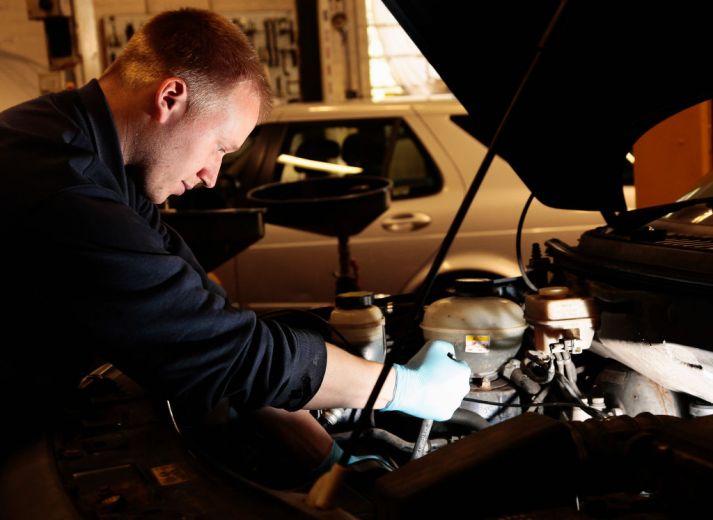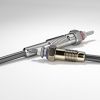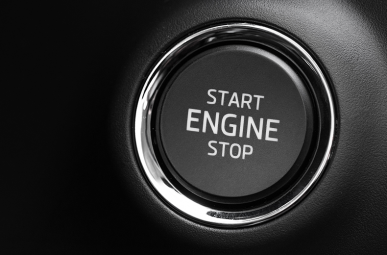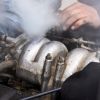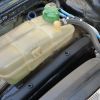For internal combustion vehicles – ones that use petrol or diesel power – the starter motor is essential. Without it, you wouldn't be able to start the vehicle.
The starter motor is something that is tested and checked during your MOT and service – you can also book a starter motor repair with RAC Mobile Mechanics.
What is a starter motor?
The starter motor is an electric component within the engine of the vehicle that starts the engine's rotation when the ignition is engaged.
When the key is turned on or the ignition button is pressed, the starter motor is the first part of the process to get the car moving.
It starts the process of engaging the air flow into the engine.
How does a starter motor work?
After the driver turns on the engine – either through the stop/start button or traditional key – there will be an electrical signal sent to the starter solenoid.
This component sends the charge to the vehicle’s battery then into the starter motor.
The electrical current activates the starter motor, and a gear system called the starter drive or Bendix. Following this, the electrical charge engages the vehicle's flywheel.
As the starter motor turns, it cranks the engine, initiating the combustion process in petrol and diesel vehicles.
Once your engine is working correctly, the mechanism that connects the starter motor from the gear and flywheel as the engine no longer needs the electrical spark to kickstart the engine.
What causes a starter motor failure?
There are many reasons why you may have a faulty of broken starter motor in your vehicle.
These are some of the most common examples of why your starter motor has failed:
- Broken/faulty solenoid, gear, or fan within the starter motor housing
- Mechanical issues – wiring and sensors within the starter motor or engine could be broken
- Electrical faults – connectors and defective ignition switches could cause issues for starter motors
- Overheating – either an engine or starter motor that runs too hot will not only cause the car to breakdown, but also could permanently damage the component
- Wear and tear – over time, many parts of vehicle will not be as effective or work correctly, so they may need to be replaced
- To ensure your starter motor is working to its full capacity, servicing your vehicle is vitally important.
Your starter motor will also be checked during the annual MOT.
Regular car maintenance will help preserve your starter motor and all other parts that feed into the engine.
What concerns you most about a failing starter motor?
In a 2025 RAC Drive poll of 5198 readers, here are the results:
- Difficulty getting my car started - 3523 Votes (67.8%)
- The cost of repair or replacement - 949 Votes (18.3%)
- Not being able to get my car fixed quickly - 427 Votes (8.2%)
- I’ve never thought about it! - 299 Votes (5.8%)
Get a car service at home
RAC Mobile Mechanics can come to you, saving you the hassle of going to a garage.


Where is the starter motor located?
A starter motor can be found at the back of the engine, towards the lower part of the housing that keeps the engine and its components in place when the car is in motion.
This is because it is one of the first active parts of the engine system when the key is turned, or ignition is started by the driver.
However, the location can vary depending on the make, model, and vehicle.
If you are concerned there may be issues with your starter motor, and are unsure where it is located, take the vehicle to your local garage or call a mobile mechanic.
Does a starter motor drain the battery?
Although the starter motor needs an electrical surge for it to work correctly, it should not continuously drain power from the car’s battery.
This is because it only operates for a very short period of time when the driver first turns the key or presses the ignition button.
The time the starter motor is engaged is less than five seconds – unless there is a problem.
If there is an issue, where the starter motor is being used for an extended period of time, then it can start draining the battery.
However, this would need to be for a very long time for it to cause major problems for the car battery.
Should the battery drain significantly because of the starter motor, then it is normally a sign that there was already an issue with your car battery.
How to test a starter motor
If you are comfortable checking out the starter motor for any potential faults, then this is how you can test for any issues.
- Listen for clicking sounds when turning the key or pressing the ignition button. If you hear a rapid clicking noise, then it will indicate several faults with the motor. Call a mechanic as soon as possible.
- Check the car battery. This can lead to many faults, so ensuring that it is in complete working order is important for all drivers.
- Test connections and sensors. There are many electrical wires and sensors in and around the engine and starter motor. They all need to be working for the starter motor to do its job.
If these tips don’t work, then it could indicate a more serious problem involving the gear, engine, or solenoid.
Electrical issues?
If your car battery keeps dying or electrical systems are acting up, it could be a faulty alternator. Book an RAC Mobile Mechanic today.


How long does a starter motor last?
A starter motor in most cars will last the lifespan of the vehicle, unless there is an issue or a faulty system. This means they typically last for 100,000 to 150,000 miles.
This can vary depending on the make and model of the vehicle - as well as the quality of the starter motor itself.
How much is a starter motor
If you are looking to buy a replacement starter motor in the UK, then it will likely cost your in excess of £230.
In fact, whocanfixmycar states that the average replacement cost is £384.
This can increase significantly depending on the make, model, age, and type of vehicle you drive.
It may also require extensive work to fix the components around the starter motor – so the price could rise exponentially.
Below is the average replacement cost by manufacturer:
Source: whocanfixmycar, May 2025
| Manufacturer | Avg. replacement cost |
|---|---|
| Audi | £503 |
| BMW | £416 |
| Citroen | £362 |
| Ford | £333 |
| MINI | £444 |
| Mercedes | £449 |
| Nissan | £368 |
| Peugeot | £386 |
| Renault | £404 |
| Toyota | £344 |
| Vauxhall | £398 |
| Volkswagen | £382 |

RAC sale – up to 33% off*
• Roadside cover from £5.29 a month†
• We get to most breakdowns in 60 mins or less
• Our patrols fix 4/5 breakdowns on the spot


